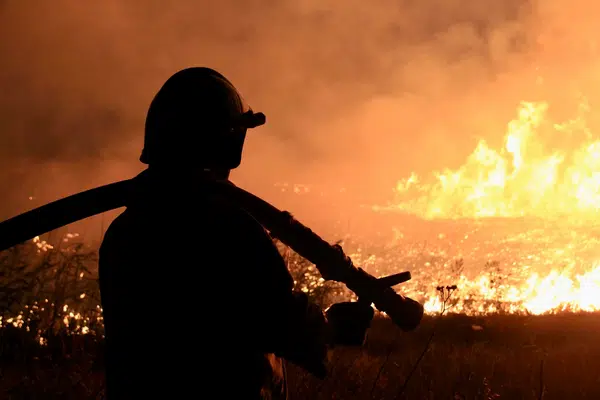

Though solar farm fires are rare, they are not impossible. Any high-power electrical equipment, including a solar power plant, presents a risk for fire. The good news is that solar farm fire protection has quickly evolved along with the solar industry. Let’s talk more about what happens in the worst-case scenario when a fire does break out at a solar farm.
When a fire starts at a solar farm, it rarely begins with the solar panel itself. The cables and connectors going into the panel, though, are a common place that fires start. Fires at a solar farm can also start within the DC combiner boxes or inverters, which manage and convert the electricity. There are four main parts that make up a solar farm:
The inverters, DC combiner boxers, connectors, and cables are the most common places where solar farm fires start. Electrical shorts, flying sparks, and extreme heat buildup inside the equipment are some of the leading causes. This is why regular maintenance and code inspections are so essential.
Just because solar fires rarely occur does not mean the panels are fireproof. During a fire, they will not only be damaged, but can also cause more damage.
If there is still light in the environment, a solar panel will continue to generate DC current until a system failure or other intervention. The risk of a live electrical current plays a major role in firefighter safety and emergency response for solar power systems. Firefighters and first responders must control the blaze without increasing their risk of electrocution. This can be especially complicated with DC current, which is more unpredictable and difficult to detect than AC power. When automatic fire suppression systems are installed in high-risk areas like the inverter, the can detect and suppress a fire before the fire can spread. The systems can also provide notification when the system is activated and shut down and disconnect of the inverter.
When a solar farm catches fire, what happens next depends on a number of variables, including the presence or absence of a fire suppression system. With a fire suppression system in place, the fire is likely to be contained within the electrical cabinet or inverter enclosure at the point of system failure. The fire suppression systems release an agent that suppresses the fire without damaging the electronics and leaves no residue. Without such a system, the fire can spread within the inverter or to other equipment and the surrounding environment. This not only increases the risk to life and safety, but also impacts the bottom line. The more solar and electrical equipment damaged in the fire, the more expensive it is to replace and the longer the solar farm will be offline. In worst-case scenarios, the entire area might suffer power shortages or environmental hazards due to large-scale solar farm fires.

Though solar farm fires are not common, it only takes one incident to cause devastating consequences for life, safety, the community, and the bottom line of a business. The solar industry has learned enough about fire risks to take strategic, targeted action through fire mitigation.
As OSTİM Defense and Aerospace Cluster (OSSA), we held a cooperation meeting with the Ministry of National Defense General Directorate of Technical Services. The opening remarks were delivered by OSSA Chairman of the Board, Mr. İbrahim Yarsan; ASFAT General Manager, Prof. Dr. Mustafa İlbaş; and Major General Ercan Eroğlu, General Director of Technical Services at the Ministry of National Defense. Following the opening session, experts from the Ministry of National Defense delivered informative presentations on “Introduction to MoD Military Factories” and “MoD Facility Security Clearance / Production Permit Certificate Processes.” As Nero Industry, we had the opportunity to present our products and capabilities to the MoD delegation and engage in bilateral cooperation meetings throughout the program.
*Legal Notice and Intellectual Property Disclaimer:
The entire content of this website including but not limited to all textual content, graphics, logos, images, photographs, illustrations, technical and scientific drawings, audio and video clips, animations, audiovisual recordings, software, source code, databases, design elements, user interface components, and all other technical and creative materials, together with all associated intellectual and industrial property rights is the sole and exclusive property of NERO Industries Defense Inc. or its duly authorized licensors. Such content is protected under the applicable laws and regulations of the Republic of Turkey, including but not limited to the Law on Intellectual and Artistic Works (Law No. 5846), the Turkish Commercial Code, the Turkish Penal Code, as well as all relevant international treaties and conventions to which the Republic of Turkey is a party, including but not limited to the Berne Convention for the Protection of Literary and Artistic Works, the Paris Convention for the Protection of Industrial Property, the TRIPS Agreement, the WIPO Copyright Treaty, and relevant European Union Directives and Regulations, whether currently in force or entering into force in the future. Unless expressly authorized in writing by NERO Industries Defense Inc., any reproduction, modification, transmission, dissemination, republication, uploading to other platforms, storage, public display or performance, commercial exploitation, or any other form of unauthorized use, whether in whole or in part, directly or indirectly, verbatim or in altered form, of the above-mentioned materials is strictly prohibited. Furthermore, any facilitation, encouragement, or promotion of such unauthorized acts is equally prohibited. Any infringement of these rights may constitute a violation of intellectual property and/or unfair competition laws and may result in civil and/or criminal liability under applicable national and international legal frameworks.
Nero Industries develops fire suppression systems, CBRN, laser warning systems, smoke launchers and military generators as one of Turkey’s leading defense industry manufacturers.
NCAGE CODE: T9830